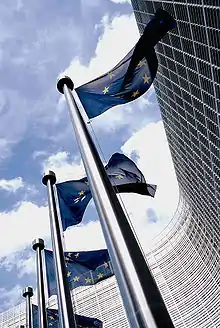Von der Leyen Commission
The von der Leyen Commission is the current European Commission, in office since 1 December 2019 and is to last until the 2024 elections. Its president is Ursula von der Leyen, who presides over a commission composed of one commissioner from each of the states composing the European Union, except Germany, which is von der Leyen's member state.
| Von der Leyen Commission | |
|---|---|
 7th Commission of the European Union | |
.jpg.webp) | |
| Date formed | 1 December 2019 |
| People and organisations | |
| Head of Commission | |
| Deputy Head of Commission | |
| No. of commissioners | 27 |
| Member parties |
|
| Status in legislature | |
| History | |
| Election(s) | 2019 European Parliament election |
| Legislature term(s) | Ninth |
| Budget(s) | €165.8 billion (2019) |
| Predecessor | Juncker Commission |
The Commission was scheduled to take office on 1 November 2019; however, the French, Hungarian and Romanian commissioner-candidates lost their confirmation votes by the European Parliament in early October 2019,[1] so new commissioners had to be selected from those three member states by the President-elect and subsequently confirmed by the Parliament. This process took place in November 2019 and the Commission eventually took office in its entirety on 1 December 2019.[2]
Election and formation
Von der Leyen, a member of the European People's Party (EPP), was selected and proposed to the European Parliament by the European Council on 3 July 2019 following a three day long negotiations between leaders of the member states. Von der Leyen faced many critics, especially by MEPs since the European Council ignored the so-called spitzenkandidat system when choosing candidate for the position.
On 16 July 2019, European Parliament took a vote on the proposal by the European Council and elected Von der Leyen with 383 votes (374 votes needed). Before the vote von der Leyen had a declared support of three largest political groups in the Parliament (EPP, S&D and RE), and during the debate conservative Polish party Law and Justice (PiS) with 24 MEPs, and Italian Five Stars Movement (M5S) with 14 MEPs declared their support for von der Leyen. Based on the result of the vote nearly 100 MEPs of the unofficial grand coalition EPP-S&D-RE did not vote for Von der Leyen. Based on the debate and public announcements of the MEPs most of the MEPs voting against von der Leyen probably came from S&D group, part of which is also German Social Democratic Party which publicly opposed Von der Leyen due to her work as German Defence Minister.[3]
Following her election, President of the European Council Donald Tusk asked von der Leyen to give her consent on appointing Josep Borrell of Spain the next EU High Representative. Consent was given on 26 July 2019, following which, the European Council officially appointed Borrell the next High Representative of the Union for Foreign Affairs and Security Policy on 5 August 2019.[4][5][6] Borrell is to be officially nominated by the Spanish government and has to pass the vote of the European Parliament AFET Committee after a hearing before the same committee.
The Commission was approved by European Parliament on 27 November 2019, receiving 461 votes, with 157 against and 89 abstentions. EPP, S&D, Renew Europe and half of ECR voted in favour. Greens/EFA abstained.[7]
College of Commissioners
Even before von der Leyen's confirmation, she pledged to renominate Frans Timmermans, the spitzenkandidat of the Party of European Socialists (PES), as the First Vice President. Margrethe Vestager, one of the leading candidates of the Alliance of Liberal and Democrats for Europe Party (ALDE), was said by von der Leyen will become Vice President as well, having de facto equal position to that of Timmermans. Other names have been mentioned by various news outlets as candidates. Some of the member states have already submitted the official nominations to the President-in-office of the Council of the EU.
Von der Leyen requested that member states each propose two candidates, one of each gender, so it would be easier to form a gender balanced commission. France's Thierry Breton was the last candidate to be designated on 24 October 2019 by Emmanuel Macron.
| Commissioner | Portrait | Portfolio[8] | EU Party (Nat. Party) | Member State[lower-alpha 1] | Date of official nomination | Ref. | ||
|---|---|---|---|---|---|---|---|---|
| Ursula von der Leyen | .jpg.webp) |
President | EPP (CDU) |
2 July 2019 (by the European Council) | [9][10] | |||
| Frans Timmermans | _Hearing_of_Frans_Timmermans_(the_Netherlands)_-_Executive_Vice_President-Designate_-_European_Green_Deal_(48866429362)_(cropped).jpg.webp) |
European Green Deal (First Vice President and Executive Vice President) Climate Action |
PES (PvdA) |
[9][10] | ||||
| Margrethe Vestager | _Hearings_of_Margrethe_Vestager_DK%252C_vice_president-designate_for_a_Europe_fit_for_the_digital_age_(48865071413)_(cropped).jpg.webp) |
A Europe Fit for the Digital Age (Executive Vice President) Competition |
ALDE (B) |
1 August 2019 | [9][11][12][10] | |||
| Valdis Dombrovskis | .jpg.webp) |
An Economy That Works for People (Executive Vice President) Trade |
EPP (V) |
23 July 2019 | [9][13][10] | |||
| Josep Borrell | .jpg.webp) |
Foreign Affairs and Security Policy (Vice President) | PES (PSOE) |
[9][4][5][6][10] | ||||
| Maroš Šefčovič | ._Energy_Ministers_press_conference_(36950060020)_(cropped).jpg.webp) |
Interinstitutional Relations and Foresight (Vice President) | PES (Smer-SD) |
19 July 2019 | [9][14][10] | |||
| Věra Jourová | 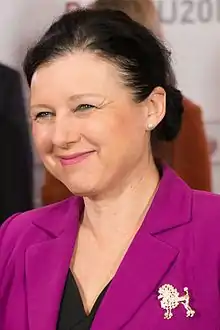 |
Values and Transparency (Vice President) | ALDE (ANO) |
[15][10] | ||||
| Dubravka Šuica | .jpg.webp) |
Democracy and Demography (Vice President) | EPP (HDZ) |
[16][10] | ||||
| Margaritis Schinas | _-_Protecting_our_European_way_of_life_(48838400957)_(cropped).jpg.webp) |
Promoting the European Way of Life (Vice President) | EPP (ND) |
23 July 2019 | [17][18][10] | |||
| Johannes Hahn | 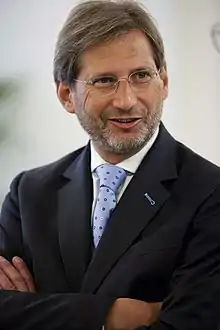 |
Budget and Administration | EPP (ÖVP) |
22 July 2019 | [19][20][10] | |||
| Mariya Gabriel | 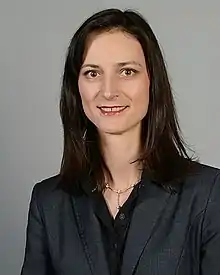 |
Innovation, Research, Culture, Education and Youth | EPP (GERB) |
23 July 2019 | [9][21][10] | |||
| Nicolas Schmit | ._Handshake_and_welcome_Jevgeni_Ossinovski%252C_Nicolas_Schmit_and_Kaia_Iva_(35979354896)_-_CROP_SCHMIT.jpg.webp) |
Jobs and Social Rights | PES (LSAP) |
[9][10] | ||||
| Paolo Gentiloni | .jpg.webp) |
Economy | PES (PD) |
5 September 2019 | [22][10] | |||
| Janusz Wojciechowski | _-_Agriculture_(48826794617)_(cropped).jpg.webp) |
Agriculture | ECR (PiS) |
[23][10] | ||||
| Elisa Ferreira | %252C_candidate_commissioner_for_cohesion_and_reforms_(48833172086)_(cropped).jpg.webp) |
Cohesion and Reforms | PES (PS) |
[24][25][10] | ||||
| Olivér Várhelyi | _-_Designate_-_Neighbourhood_and_Enlargement_(49063520601)_(cropped2).jpg.webp) |
Neighbourhood and Enlargement | EPP (independent on national level) |
[9][10] | ||||
| Stella Kyriakidou | _-_Health_(48828012607)_(cropped2).jpg.webp) |
Health | EPP (DISY) |
23 July 2019 | [9][26][10] | |||
| Didier Reynders | _(cropped).jpg.webp) |
Justice | ALDE (MR) |
[27][10] | ||||
| Adina Vălean | -_Commissioner_Designate_-_European_Green_Deal_(49063874993)_(cropped).jpg.webp) |
Transport | EPP (PNL) |
[28][10] | ||||
| Helena Dalli | %252C_candidate_commissioner_for_equality_(48832245446)_(cropped).jpg.webp) |
Equality | PES (PL) |
[29][10] | ||||
| Thierry Breton | _(cropped).jpg.webp) |
Internal Market | Ind. | 24 October 2019 | [30][10] | |||
| Ylva Johansson | 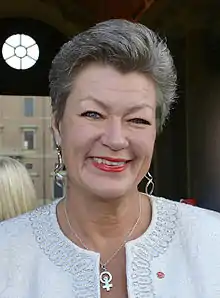 |
Home Affairs | PES (S) |
[31][10] | ||||
| Janez Lenarčič | _-_Crisis_management_(48833246092)_(cropped).jpg.webp) |
Crisis Management | ALDE (Ind.) |
26 July 2019 | [32][33][10] | |||
| Jutta Urpilainen | .jpg.webp) |
International Partnerships | PES (SDP) |
22 July 2019 | [34][35][10] | |||
| Kadri Simson | .jpg.webp) |
Energy | ALDE (KESK) |
22 July 2019 | [36][37][10] | |||
| Virginijus Sinkevičius | 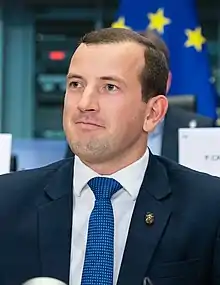 |
Environment, Oceans and Fisheries | None (LVŽS) |
[38][10] | ||||
| Mairead McGuinness | .jpg.webp) |
Financial Stability, Financial Services and the Capital Markets Union | EPP (FG) |
8 September 2020 | [39] | |||
Changes
- 26 August 2020: Following Golfgate, and a controversy about his travels in Ireland in preceding weeks, which conflicted with the Irish Covid-19 guidelines, Trade Commissioner Phil Hogan resigned.[40]
- 7 October 2020: Mairead McGuinness, Irelands nominee to replace Phil Hogan is confirmed by the European Parliament and becomes a member of the commission[41]
Commission departments
.jpg.webp)
Directorates-General
Executive agencies
| Executive Agency | Head | |
|---|---|---|
| Name | Abbr. | |
| Consumers, Health, Agriculture and Food Executive Agency | CHAFEA | Véronique Wasbauer |
| Education, Audiovisual and Culture Executive Agency | EACEA | |
| European Research Council Executive Agency | ERCEA | |
| Executive Agency for Small and Medium-sized Enterprises | EASME | Luisa Prista (acting) |
| Research Executive Agency | REA | Marc Tachelet |
Service departments
| Service department | Head | |
|---|---|---|
| Name | Abbr. | |
| Administration and Payment of Individual Entitlements | PMO | |
| Data Protection Officer | DPO | |
| European Anti-Fraud Office | OLAF | |
| European Personnel Selection Office | EPSO | |
| European Political Strategy Centre | EPSC | |
| Foreign Policy Instruments | FPI | |
| Historical Archives Service | ||
| Infrastructure and Logistics in Brussels | OIB | |
| Infrastructure and Logistics in Luxembourg | OIL | |
| Innovation and Networks Executive Agency | INEA | |
| Internal Audit Service | IAS | |
| Legal Service | SJ | |
| Library and e-Resources Centre | ||
| Publications Office | OP | |
| Secretariat-General | SG | |
| Structural Reform Support Service | SRSS | |
| Taskforce on Article 50 negotiations with the United Kingdom | ||
Selection of the candidate for president
Following the example of the 2014 European Election, in advance of the 2019 elections the main European political parties named so-called spitzenkandidaten, or leading candidates, who were the parties' candidates to become the next president of the European Commission. All of the parties named at least one candidate; some named two, while the Alliance of Liberals and Democrats for Europe Party (ALDE), which officially opposed the system of spitzenkandidaten, introduced "Team Europe," which consisted of several high-ranking European politicians. However, other parties perceived those candidates, especially Margrethe Vestager of Denmark, as leading candidates.
The leading candidates were:
After winning 2019 European election, the European People's Party claimed that the position of the President of the European Commission should be given to them and wanted their leading candidate Manfred Weber for the job. However, Weber faced strong opposition from the liberal-leaning French President Emmanuel Macron and the ALDE, and from the Party of European Socialists (PES) as well; opposition was driven by Weber's lack of experience, since he had only previously served as MEP and never held any governmental position.[42] The PES strongly supported the candidature of Frans Timmermans, who also had support from most of the ALDE members of the European Council. (Czech Prime Minister Andrej Babiš is a member of the ALDE but also of the Visegrad Four, which strongly opposed Timmermans because of his support for migration quotas and inability to reach compromises.[43]) The ALDE Party wanted to see Margrethe Vestager taking the top Commission job.
The first European Council meeting was held on 20 and 21 June 2019, bringing no decision on distribution of EU top jobs. President Donald Tusk summoned leaders again for a special meeting that lasted from 30 June until 2 July 2019. Over three days of negotiations, the EPP gave up on Weber becoming the President of the Commission; it seemed that Timmermans might be nominated, especially after he met with Bulgarian Prime Minister and EPP member Boyko Borisov at the Bulgarian Embassy in Belgium during the meeting of the European Council. Naming Timmermans President of the European Commission would have been a part of the so-called Osaka deal, a plan that was formed by several EU leaders (Emmanuel Macron, Angela Merkel, Giuseppe Conte, Donald Tusk, Mark Rutte, and Pedro Sánchez) during the 2019 G20 Summit in Osaka, Japan.
However, the opposition from Visegrad Four, now joined by Croatia and Italy, was still strong, and Timmermans could not win a Council majority. Other names mentioned during the negotiations included Michel Barnier, Kristalina Georgieva and Andrej Plenković; it became clear after the Council ended that Plenković's name had been introduced by Commission Secretary-General Martin Selmayr, who is Plenković's close friend. The candidature was rejected by Macron, who opposed the personal ambitions of leaders.[44]
When Ursula von der Leyen (EPP)'s name emerged as a potential candidate, it was a surprise and she faced many critics, mainly because she had not been a spitzenkandidat. The German Social Democratic Party, part of the German government coalition, opposed von der Leyen due to her work as minister of defence, which resulted in the German Chancellor Angela Merkel's abstention during the Council's vote on the proposal. Nevertheless, all other European Council members voted in favor, and she was nominated as the next President of the European Commission.
Brexit
With the three month Brexit delay requested, the United Kingdom had not nominated any British commissioner. This was a unique event with no precedent in the history of the European Union. Von der Leyen had to formally request the British Government nominate an EU commissioner. She also asked the legal service if the Commission could operate without a British commissioner. Some MEPs have suggested the possibility of a vote to allow the EU Commission to operate without a British commissioner.[45]
The United Kingdom left the European Union at 23:59 on 31 January 2020, so the position of British commissioner remained vacant until its automatic abolition when Brexit finally occurred.
Geopolitical Commission
From the outset of her mandate as President of the European Commission, Von der Leyen stated her intention to have a “geopolitical commission.”[46] The French President Emmanuel Macron is the most important driving force behind the ambition of a geopolitical commission. His vision is that the EU must become a political and strategic player with one voice.[47] Critics have pointed out that by flying the geopolitical flag, Commission President von der Leyen has exposed the weaknesses of the EU as a whole in playing a decisive role at the high diplomatic table.[48]
Notes
- No nominee was proposed by the United Kingdom
References
- Amaro, Silvia (1 November 2019). "The new EU leadership is in limbo after lawmakers reject three new members". CNBC. Retrieved 2019-11-01.
- "Von der Leyen's in — now the hard work begins". POLITICO. 2019-11-27. Retrieved 2019-12-02.
- "Ursula von der Leyen elected European Commission president". POLITICO. 2019-07-16. Retrieved 2019-08-15.
- "Data". data.consilium.europa.eu. Retrieved 2020-05-02.
- "Data". data.consilium.europa.eu. Retrieved 2020-05-02.
- "Info". eur-lex.europa.eu. Retrieved 2020-05-02.
- "Election of the Commission". VoteWatch Europe. Retrieved 3 December 2019.
- "Next European Commission: List in full". POLITICO. 2019-09-10. Retrieved 2019-09-10.
- Bayer, Lili (10 July 2019). "The next European Commission: What we know so far". Politico Europe. Retrieved 16 July 2019.
- "Commissioners-designate". ec.europa.eu. European Commission. 10 September 2019. Retrieved 10 September 2019.
- "Data". data.consilium.europa.eu. Retrieved 2020-05-02.
- Aagaard, Thomas; Danielsen, Mikkel (10 September 2019). "Kommende kommisionsformand løfter sløret: Her er Vestagers nye job". berlingske.dk/ (in Danish). Berlingske Media. Berlingske. Retrieved 10 September 2019.
- "Data". data.consilium.europa.eu. Retrieved 2020-05-02.
- "Data". data.consilium.europa.eu. Retrieved 2020-05-02.
- "France eyes Selmayr's post to balance German Commission presidency". Euractiv. 18 July 2019. Retrieved 18 July 2019.
- "Plenković predlaže Sanadera za tajnika HDZ-a, Šuicu za EK". Hrvatska radiotelevizija. Retrieved 2019-08-21.
- Bayer, Lili (18 July 2019). "Commission spokesperson nominated as next Greek European commissioner". Politico Europe. Retrieved 18 July 2019.
- "Data". data.consilium.europa.eu. Retrieved 2020-05-02.
- "Bundeskanzlerin Bierlein zur Nominierung von Johannes Hahn als EU-Kommissar - Bundeskanzleramt Österreich". www.bundeskanzleramt.gv.at. Retrieved 2019-07-30.
- "Data". data.consilium.europa.eu. Retrieved 2020-05-02.
- "Data". data.consilium.europa.eu. Retrieved 2020-05-02.
- "Il giorno di Gentiloni, i ruoli Ue in mano al Partito democratico". Il Fatto Quotidiano.
- "Agriculture commission seat almost sure for Poland - gov't spokesperson". www.thefirstnews.com.
- Siza, Rita. "Costa propõe Pedro Marques ou Elisa Ferreira para comissário europeu". PÚBLICO (in Portuguese). Retrieved 2019-08-09.
- "Costa escolhe Elisa Ferreira para Comissária Europeia". Jornal Expresso (in Portuguese). Retrieved 2019-08-27.
- "Data". data.consilium.europa.eu. Retrieved 2020-05-02.
- "Commissaire européen: Didier Reynders est annoncé". www.lesoir.be. 2019-08-19. Retrieved 2019-08-19.
- "MEP Adina Valean approved as Romania's European Commissioner". Euronews. Retrieved 2019-11-07.
- "STATEMENT BY THE GOVERNMENT OF MALTA: The Prime Minister nominates Dr Helena Dalli as member of the European Commission". www.gov.mt. Retrieved 2019-07-30.
- "Sylvie Goulard proposée par la France pour être commissaire européenne" (in French). 2019-08-28. Retrieved 2019-08-28.
- TT (2019-08-08). "Ylva Johansson föreslås bli ny EU-kommissionär" (in Swedish). Retrieved 2019-08-08.
- komuniciranje, Urad vlade Republike Slovenije za. "Vlada o predlogu kandidata za člana Evropske komisije in ustanovitvi Slovenske hiše v Bruslju | GOV.SI". Portal GOV.SI (in Slovenian). Retrieved 2019-07-30.
- "Data". data.consilium.europa.eu. Retrieved 2020-05-02.
- "Finnish Government nominated Jutta Urpilainen as candidate for EU Commissioner". Valtioneuvosto. Retrieved 2019-07-30.
- "Data". data.consilium.europa.eu. Retrieved 2020-05-02.
- "The Government approved the proposal to submit Kadri Simson as the candidate for European Commissioner". Government of the Republic of Estonia. Retrieved 2019-07-30.
- "Data". data.consilium.europa.eu. Retrieved 2020-05-02.
- Herszenhorn, David M. (2019-08-07). "Lithuania puts forward economy minister for European Commission". POLITICO. Retrieved 2019-08-07.
- "Mairead McGuinness named as Ireland's European Commissioner". www.rte.ie. Retrieved 2020-09-08.
- "Trade chief Phil Hogan's resignation blows hole in European Commission". POLITICO. August 26, 2020.
- Correspondent, Naomi O’Leary Europe. "Mairead McGuinness approved as Irish commissioner in European Parliament". The Irish Times.
- "Weber won't be next European Commission president: report | DW | 28.06.2019". DW.COM. Retrieved 2019-08-13.
- "Timmermanse neschválíme, prohlásil Babiš. Kritizuje jej za migrační kvóty a předsudky vůči střední Evropě". Lidovky.cz (in Czech). 1 July 2019. Retrieved 3 December 2019.
- "Coulisses de Bruxelles - Martin Selmayr au service du Premier ministre croate, Andrej Plenković - Libération.fr". bruxelles.blogs.liberation.fr. Retrieved 2019-08-13.
- Correspondent, Joe Barnes, Brussels (October 29, 2019). "EU's Brexit crisis: VDL's lawyers scramble for loophole to block Boris' commissioner". Express.co.uk.
- Erlanger, Steven (March 12, 2020). "Coronavirus Tests Europe's Cohesion, Alliances and Even Democracy". The New York Times. Retrieved December 27, 2020. Cite magazine requires
|magazine=(help) - Rahman, Mujtaba (February 3, 2020). "Europe's next crisis: The geopolitical Commission". Politico. Retrieved December 27, 2020. Cite magazine requires
|magazine=(help) - Blockmans, Steven (September 15, 2020). "Why the EU needs a geopolitical Commission". Centre for European Policy Studies. Retrieved December 27, 2020. Cite magazine requires
|magazine=(help)
